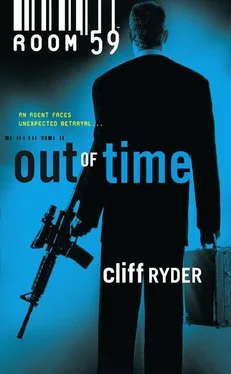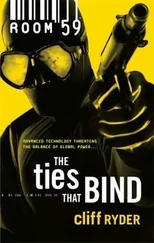“What are you talking about?” he growled. He spun the folder to face him, but didn’t open it immediately. He glared at it, then swung his gaze back to hers. “I have seen the results. I know that they work—I’ve seen the results. What kind of crap are you trying to pull?”
“No crap at all,” she said. “They don’t work like you think they do. Your boys in China aren’t as thorough as we are over here—they don’t have the same restrictions keeping them from juicing up human guinea pigs. Did you know that they ran their results on only twelve-day cultures? All of them! They sent us the mature samples, but they did no research beyond the moment they deemed the cells healthy. What would you do if I turned in work like that, Hershel? I don’t think I’d have been working here long.”
“Stop screwing around and tell me what you found,” he said, his voice suddenly dull with fatigue. She was surprised to hear the spark gone from his voice so quickly, and again she wondered what it was she didn’t know. She glanced quickly at his computer monitor, but the screen saver was flipping and rolling in on itself, a psychedelic pattern covering whatever he’d been reading or doing before Brin arrived.
“They don’t stop when the cells are healthy,”
she said. “Not every time. I’d need months, maybe years to know if they ever really stop. They mutate.
When the cells are all healthy, the nanoagents in-corporate minute differences from their host cells.
They start wars. I don’t know what happens next, not all of it, but I know the cells start attacking one another, trying to become the dominant program.”
Rand started laughing and Brin fell silent, watching him as if he’d lost his mind—wondering if maybe he had.
“Did you hear what I said?” she asked.
Rand tried to speak, choked on the laughter, then got himself under control. “What you’re telling me the problem is, then,” he managed to say at last, “is that my weapon will kill people?”
His laughter fueled her anger. “What I’m telling you, you idiot, is that if you let this crap out into the atmosphere to kill a few thousand or a few hundred thousand people, it isn’t going to stop there. The people will die—the nanoagents may not. They might move on to healthier hosts. They might enter the cell walls of plants, animals, get into the water supply. The end result of it, if you just let it go, is that you, your bosses back in China, or wherever the hell this crazy mess started, are going to die. Everyone will die, and the possibility exists that the world, as we know it, will cease to exist. How am I doing? Am I talking slowly enough?”
Rand’s face darkened.
“Maybe you’d like to rethink your attitude,” he said. “Or did you forget where your precious husband is? You may have noticed I’m not in a great mood. My sense of humor has suffered.”
“If you’re still considering using the nanoagents after what I just told you, your sense of humor isn’t the only thing that has suffered,” she retorted.
“Hershel, what happened to you? I remember when I first came here—the work you were doing was brilliant. It’s part of why I wanted to work for MRIS. Why this?”
“Things change,” Rand replied. “Not always, or usually, for the better. Everything I needed to know, you’ve just given me.”
“Why?” she asked. She leaned closer, putting her hands on his desk and catching his gaze. “Why would you do this? I have a right to know what I’ve been part of, whose cause my work has been warped to serve.”
“You don’t have a right in the world,” Rand snapped. “I need the samples ready to be shipped out in the morning, before sunrise. Include all your research, particularly this last part. What’s in the folder?”
“Cell models,” she replied. “Cell models that I thought you’d look at. They may be the model of the end of the world.”
“It isn’t such a great world to start with,” Rand replied. “Maybe a little genetic shake-up is in order, don’t you think? Maybe it’s time we did a quick reshuffle of the cards. We sure managed to screw the world up the first time around, why not give some three-eyed, green-skinned lizard man a shot?”
He turned back to stare out his window. “Close the door on your way out. Get those samples ready to travel, Brin. Seal them as they were when they arrived, and back up the data on that laptop. And don’t think there won’t be someone watching you.
There have been complications. We’re going to need those cultures intact.”
“And then I can go?” she asked. “I can go home?”
Rand was silent for a long moment, so long Brin almost thought she heard his heartbeat.
“Just do what you’re told,” he said at last. “We’ll sort out the rest soon enough. If what you told me is the truth, getting out of here is only a temporary parole anyway.”
Brin stared at the back of his head a moment longer, and then turned toward the outer office.
She felt calm, but she still needed a plan. She knew she couldn’t return to the lab below—there was no way she was ever opening that door again. She wished she’d paid more attention to the exits and entrances to the building. There was a map on the wall behind Elaine’s desk, and she hesitated, then stepped over and began scanning it quickly, hoping Rand was still staring out the window and that the lack of footsteps in the hall wouldn’t catch his attention. Somehow, she didn’t think he would notice.
The man acted as if he were already dead.
Maybe inside his mind, he already was.
Alex chose the maintenance entrance. He knew he could get past the main locks on the front of the building, and the loading dock offered a tempting target, as well, but the maintenance entrance gave him the advantage of quick access to all the floors, to the electrical system and the air ducts. He was somewhat familiar with the security system from his previous visits, and he knew they’d concentrated on the main entrances and obvious weak spots, but maintenance crews would often bypass or disable security that made their job more difficult. That meant there was at least a chance the maintenance door would have fewer locks and alarms on it.
Alex was ready to do the work himself, but if he could find a way past the first line of defense without putting out any real effort, it was better. He wanted to get upstairs. His normal confidence in his own abilities was severely shaken, and he needed to see Brin and to know she was all right.
He knew this was a weakness, and it grated on his nerves, but he couldn’t change it. His failure in China had made clear that his ability to be a chameleon was gone, and that even defending himself might be a difficult proposition soon. His priorities had shifted, and all he wanted was for his wife and daughter to be safe.
He watched for ten minutes without moving, standing in the shadow of a locked Dumpster. He’d stashed his duffel bag behind it. No one approached the maintenance door, and he saw no sign of movement or light on the inside. Apparently, if there was a maintenance staff working after hours, it was a small and inactive one. More likely, they only came in on call after regular business hours.
When he was convinced it was clear, he slipped up to the rear door and pulled a small meter from his pocket. He flipped a switch and ran it up and down the length of the door. The light on top remained green. He smiled. There wasn’t any kind of an infrared sensor on the door.
The lock was a traditional one, but the tumblers required an electronic signal to open. There was a card reader next to the door. He put the meter back in his pocket and removed his small cell phone.
It was a device carried by a number of the Room 59 agents and could do a lot more than place calls. From behind the keypad, he slid out a rectangle of plastic with a magnetic strip on it. He put it into the slot for the key cards, then pressed a combination of numbers on his phone. It would send out a series of short magnetic pulses that would override the lock.
Читать дальше
Конец ознакомительного отрывка
Купить книгу










